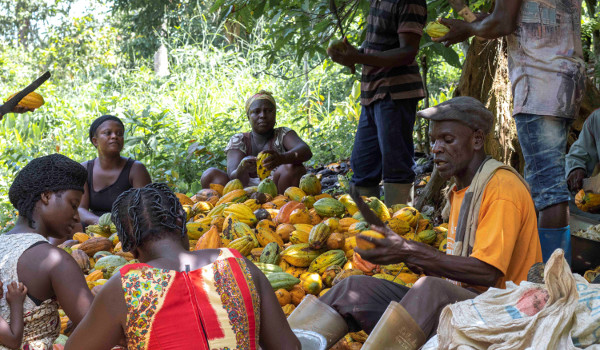A renewed commitment to advancing economic fairness, elevating the voices of cocoa farmers, and fostering sustainable solutions that enhance the standard of living for African cocoa growers and their communities has been made by the Cocoa Farmers Alliance Association of Africa (COFAAA).
During COFAAA’s worldwide webinar, Comrade Adeola Adegoke, the association’s president and global coordinator, emphasized that although though Africa supplies more than 70% of the world’s cocoa, systemic injustices and unfair international trade practices keep the continent’s farmers impoverished.
He pointed out that the African cocoa ecosystem serves as the foundation for the global chocolate sector, which is worth over $120 billion a year.
According to Adegoke, “the economic benefits are still disproportionately distributed, leaving African cocoa farmers vulnerable to poverty, price volatility, and unfair market conditions.”
He said that COFAAA wants to change this trend by working more closely with governments of African cocoa-producing nations, development partners, and international cocoa organizations to support smallholder farmers.
Read Also: Choose Leaders by Competence, Not Geography – Gbenga-Hashim Declares
According to Adegoke, “the way forward for us is to increase African cocoa production and local processing to about four million metric tonnes, representing 90% of global cocoa production.”
“This needs to be accomplished through increased productivity per hectare (800–1000 kg), sustainable practices like intensifying cocoa agroforestry, ecosystem management, traceability, premium flavor processing methods, and climate-smart and soil-friendly farming practices—all while guaranteeing youth inclusivity.”
He stated that the webinar was organized to strengthen and maintain African leadership in the global cocoa economy by bringing smallholder cocoa farmers’ voices together, increasing production using sustainable practices, and encouraging increased cooperation among stakeholders.
COFAAA is a membership-based group dedicated to addressing the most urgent issues facing cocoa growers throughout Africa, according to Adegoke.
“Our goal is to empower farmers, promote sustainable farming methods, and guarantee the long-term sustainability of the global cocoa ecosystem.” In addition to being a major economic engine, Africa’s cocoa sector is a representation of our agricultural history, he stated.
In spite of the growing risks posed by climate change, he praised the work of international cocoa organizations and stakeholders, such as the World Cocoa Foundation (WCF), Ghana Cocoa Board, Cameroon’s National Cocoa and Coffee Board, Nigeria’s National Cocoa Management Committee, the International Cocoa Organization (ICCO), and the Cote d’Ivoire-Ghana Cocoa Initiative (CIGHCI).
“To sustain our leadership in global cocoa production, which currently accounts for 70% of the world’s total, numerous African governments and institutions have already put in place sound policy frameworks and strategic partnerships,” he said.
Executive Secretary Alex Assanvo of the Cote d’Ivoire-Ghana Cocoa Initiative (CIGHCI), represented by his deputy and Technical Manager Tawiah Agyarko-Kwarteng, gave the webinar’s keynote presentation and praised COFAAA for providing a forum to elevate the voices of African cocoa producers.
According to Agyarko-Kwarteng, the partnership is appropriate and consistent with CIGHCI’s objective to enhance farmers’ well-being by utilizing the economic, social, and environmental pillars of sustainability.
She emphasised that the presidents of Ghana and Cote d’Ivoire, who together produce the majority of Africa’s cocoa production, founded the CIGHCI to address serious issues facing the cocoa industry, specifically those related to price and income for farmers in both nations.



